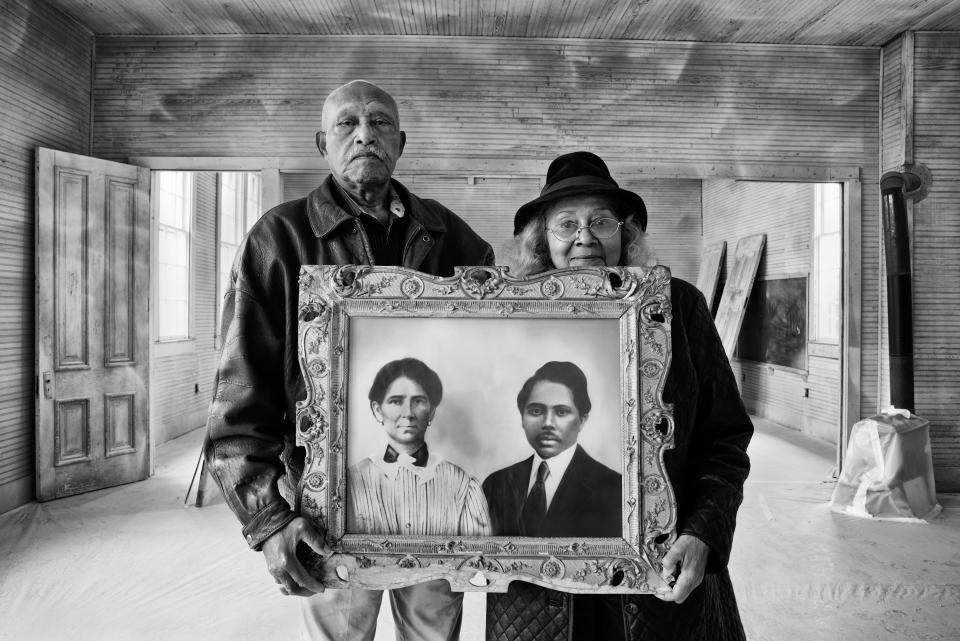'A Better Life for Their Children' photography exhibit shines light on Rosenwald Schools
- Oops!Something went wrong.Please try again later.
The National Civil Rights Museum will unveil an exhibition highlighting an impactful and often forgotten educational project for Black students during the 20th century.
"A Better Life for Their Children: Julius Rosenwald, Booker T. Washington, and the 4,978 Schools that Changed America" is a traveling photography exhibition about Rosenwald Schools built in the segregated South from 1912 to 1937. The 23-photo exhibit will be unveiled Thursday.
Photographer Andrew Feiler spent more than three years documenting what remains of the schools and the stories behind them.
"There was not a comprehensive photographic account of the program, so I set out to do exactly that. And over 3½ years, I drove 25,000 miles across all 15 of the program states," said Feiler, who is also behind the book that inspired the exhibit.

Julius Rosenwald, part-owner of Sears, Roebuck and Co., and Booker T. Washington partnered to open and fund schools that primarily served Black students in rural communities to improve access to education. There were around 250 in Tennessee alone, with a number in the Memphis area.
CIVIL RIGHTS TOURISM: Memphis and Tennessee tourism leaders discuss civil rights tourism during panel at Stax Museum
JESSE JACKSON IN MEMPHIS: Rev. Jesse Jackson pushes for automatic voter registration during Memphis visit
"We often believe in America, that problems are intractable, particularly those related to race," Feiler said. "Julius Rosenwald and Booker T. Washington are reaching across the whys of race, or religion, and region. And they fundamentally change this country."
In 2002, the National Trust for Historic Preservation named the Rosenwald Schools one of the most endangered historic places. Across the South, there were originally almost 5,000 Rosenwald Schools. Only about 500 of those survived, and only half of those have been restored. Feiler photographed 105 of these schools.
"I came across schoolhouses that had collapsed so recently they were surrounded by yellow caution tape or emergency fencing, but these structures are locusts of history and memory, and it is hugely important that we preserve our historic resources to be the vessels that are keeping our history, telling our history," Feiler said.
"When we lose structures like this, we lose a piece of the American song. And so this there is an inherent message in this body of work, which is the importance of historic preservation, the importance of preserving a diverse American narrative in telling the important role that these Rosenwald Schools played in bringing African Americans more into the promise of America."

While working his first book, "Without Regard to Sex, Race, or Color:
The Past, Present, and Future of One Historically Black College," Feiler said he got to understand the importance of education to the thread of American history from the first public school that opened in 1624 to the conversations around affordable access to higher education today.
"That is a 375-year narrative in which education has been the backbone of the American Dream, the on-ramp to the American middle class, is now a tradition at risk," Feiler said. "And we need to think seriously about how we continue to make education the vector for the promise of America."
MEMPHIANS TO KNOW: Meet Kathlyn J. Kirkwood, a South Memphis native who helped make MLK Day a federal holiday
'SUPER FLY' TURNS 50: 'We were proud to be Black people.' 50 years later, 'Super Fly' remains a vibrant time capsule into Black life
In the 20 years after the Rosenwald Schools were founded, they educated more than 700,000 students. And the legacy of the schools continues to live on in their alumni and their descendants. Notable Americans Maya Angelou and late Congressman John Lewis are both graduates of Rosenwald Schools. Lewis wrote the forward to "A Better Life for Their Children."
In the exhibit, Feiler features the stories of many attendees and descendants of people connected to the school. One photo features brothers Frank and Charles Brinkley.
"They both went to college. They both went to graduate school. Frank Brinkley becomes a high school math and science teacher. His brother Charles becomes a middle school principal," Feiler said. "They have four siblings, all of whom came through this school. These six siblings have 10 children, all 10 children went to college. That legacy may not have happened without this schoolhouse."
The majority of the structures have collapsed or have been torn down, but Feiler said some have been preserved in new ways including being repurposed as a city hall, community center, church halls, private homes and apartments.

Noelle Trent, director of Interpretation, Collections and Education at the National Civil Rights Museum, agreed the exhibit embodies major themes of equity in education and the importance of preservation.
"What I think is important about this exhibition is not just that you see the actual schools and the interior of the schools or the sites where the schools existed, but you see the people who attended the schools. And that's what's important about preservation," Trent said. "It's not just preserving the geographic landscape and environment. It's preserving those stories around it that constantly remind us and connect us to the past."
"A Better Life for Their Children: Julius Rosenwald, Booker T. Washington, and the 4,978 Schools that Changed America" will be on exhibit at the National Civil Rights Museum until Jan. 2.
Astrid Kayembe covers South Memphis, Whitehaven and Westwood. She can be reached at astrid.kayembe@commercialappeal.com, (901) 304-7929 or on Twitter @astridkayembe_.
This article originally appeared on Memphis Commercial Appeal: National Civil Rights Museum to host Rosenwald Schools exhibit

